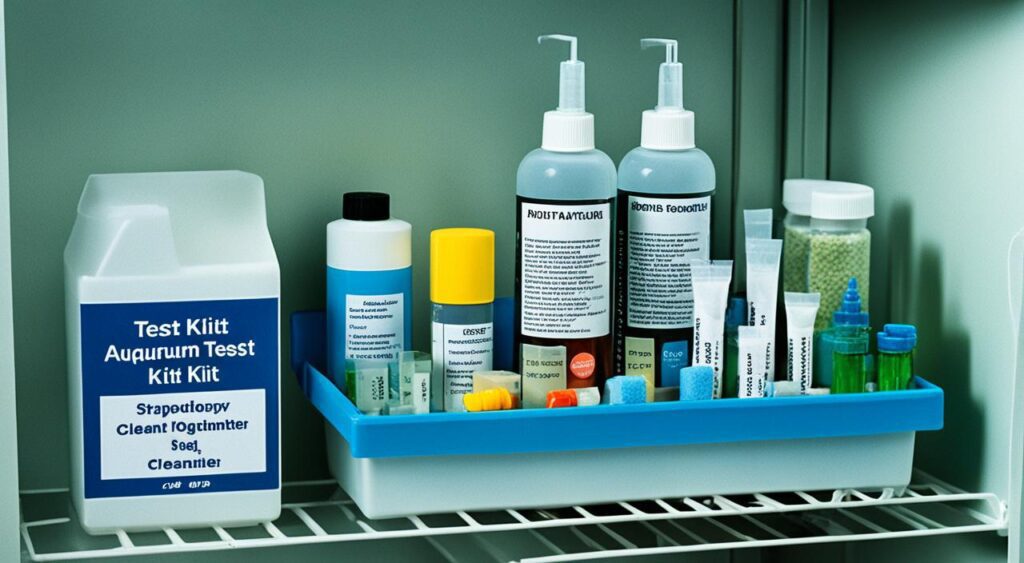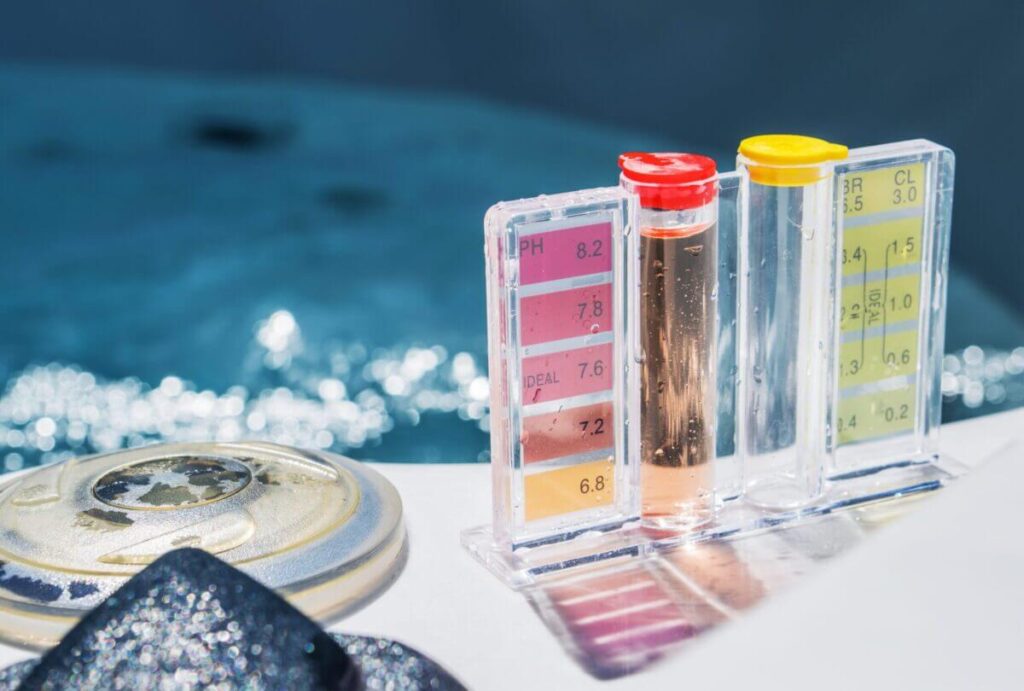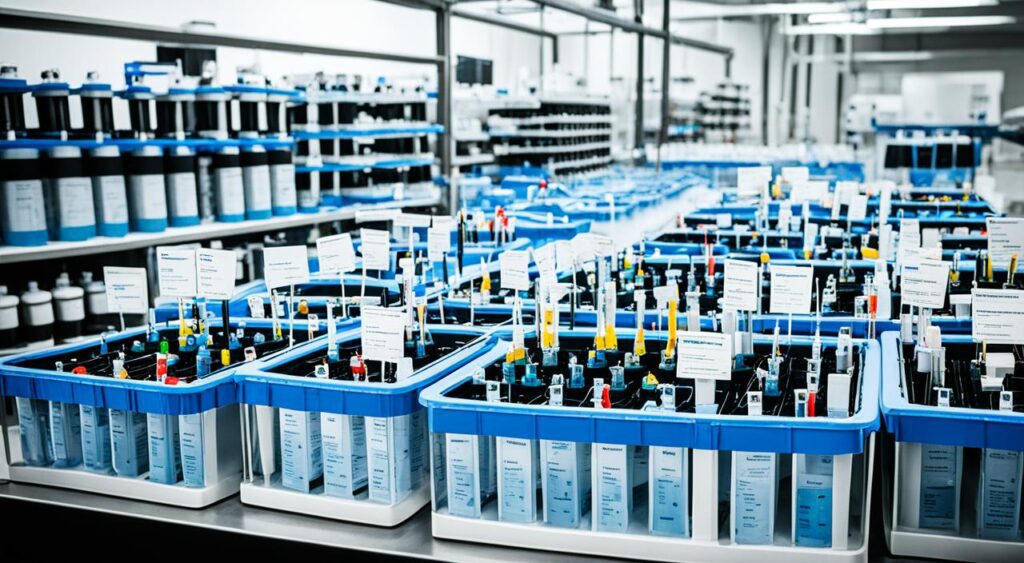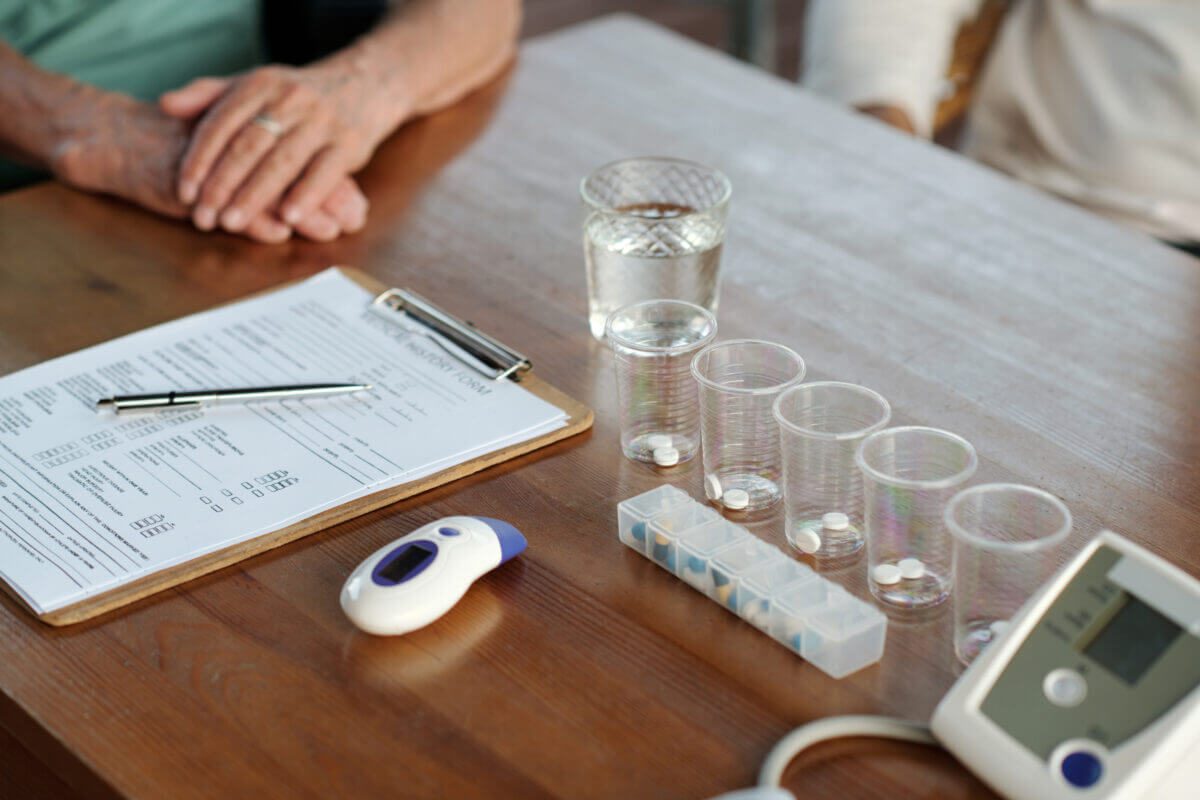In the world of aquatic ecosystems, ensuring optimal water quality is paramount. As a passionate aquarist, I know that maintaining the health and well-being of aquatic life requires careful monitoring and testing. That’s where water quality test kits come in. These handy tools provide crucial insights into the chemical parameters of our aquariums, enabling us to make informed decisions and take appropriate action.
But have you ever considered the shelf life of these test kits? Understanding the shelf life is critical to maximizing efficiency in water testing. Just like any other consumable, water-quality test kits have a limited lifespan. Using outdated or expired kits can lead to inaccurate results, potentially compromising the health of your aquatic creatures.
I will guide you through the ins and outs of water quality test kit shelf life in this article. We’ll explore the importance of reliable testing, examine key components within popular kits, and discuss strategies for proper storage. By the end, you’ll be equipped with the knowledge to make the most out of your water quality testing endeavours, ensuring the well-being of your aquatic friends.
Key Takeaways:
- Water quality test kits are essential for managing aquatic ecosystems and ensuring the health of your aquatic life.
- Understanding the shelf life of water quality test kits is crucial for maximizing efficiency and obtaining accurate results.
- Reliable aquarium testing is essential for maintaining optimal water conditions and preventing potential harm to aquatic creatures.
- Proper storage conditions, such as temperature and humidity, play a significant role in prolonging the shelf life of test kits.
- By following best practices for test kit storage and handling, you can ensure the longevity and usability of these essential tools.
The Essential Role of Water Quality Test Kits in Aquatic Ecosystem Management
To effectively manage aquatic ecosystems, understanding and maintaining water quality is crucial. Water quality test kits play an essential role in this process, providing valuable insights into the health and well-being of aquatic life. With reliable aquarium testing, aquarists and environmentalists can monitor and assess key parameters to ensure optimal conditions for freshwater and saltwater habitats.
Why Reliable Aquarium Testing Matters
Reliable aquarium testing is vital for the accurate assessment of water quality. Aquarists can identify any imbalances or pollutants in the water by testing parameters such as pH, ammonia, nitrate, nitrite, and other key components. This information allows them to take necessary actions to restore and maintain a healthy aquatic environment. Potential issues can go unnoticed without reliable testing, damaging the ecosystem and its inhabitants.
Key Components Within Popular Kits Like API Freshwater Master Test Kit
The API Freshwater Master Test Kit is a widely recognized and trusted tool among aquarists. It includes multiple essential components for comprehensive water testing. These components may include test solutions, test tubes, colour charts, and detailed instructions for accurate and precise testing. Each component plays a vital role in ensuring the reliability and effectiveness of the testing process, allowing aquarists to obtain accurate and actionable results for maintaining water quality.
Impact of Accurate Water Testing on Freshwater and Saltwater Habitats
Accurate water testing has a profound impact on the health and stability of both freshwater and saltwater habitats. Aquarists can provide an optimized environment for aquatic life by regularly monitoring and adjusting water parameters. This includes maintaining proper pH levels, controlling ammonia and nitrate levels, and ensuring the appropriate mineral content in the water. Accurate testing enables aquarists to address any imbalances promptly, preventing the onset of harmful conditions that can negatively impact the well-being of aquatic organisms.
| Benefits of Water Quality Test Kits | Effect on Aquatic Ecosystems |
|---|---|
| Ensures precise measurement of key parameters | Prevents imbalances that can harm aquatic organisms |
| Enables proactive identification of potential issues | Promotes early intervention and problem prevention |
| Provides actionable insights for appropriate corrective measures | Aids in maintaining a healthy and thriving aquatic environment |
Aquatic ecosystem management relies heavily on accurate water testing, and water quality test kits are invaluable tools for achieving this goal. The data from these tests empowers aquarists and environmentalists to make informed decisions and take necessary actions to preserve the delicate balance of freshwater and saltwater habitats.
Water Quality Test Kit Shelf Life
This section will discuss the shelf life of water quality test kits and the factors that can influence their expiry. Understanding the shelf life of these kits is essential to ensure accurate and reliable results when testing aquarium water quality.
Factors Influencing the Expiry of Aquarium Test Kits
Several factors can affect the expiry of aquarium test kits:
- Storage conditions: How test kits are stored can significantly impact their shelf life. Exposure to extreme temperatures, humidity, or direct sunlight can degrade the components and affect the accuracy of the test results. It is essential to store test kits in a cool, dry place, away from direct sunlight.
- Quality of components: The components used in test kits can also affect their expiry. Lower-quality materials may deteriorate faster, leading to inaccurate results. Choosing test kits from reputable brands prioritising quality can help extend their shelf life.
Identifying Shelf Life Indicators and Test Kit Expiry Signs
To ensure the reliability of water quality test kits, it is crucial to be able to identify shelf life indicators and recognize test kit expiry signs:
- Expiration date: Most test kits have a marked expiration date. It is essential to check this date before using the kit. Using an expired test kit can result in inaccurate readings and misinterpretation of water quality.
- Colour changes: Some test kits use colour indicators to determine water quality. Over time, these colour indicators may fade or change, indicating that the kit is no longer reliable. If you notice significant discrepancies in colour changes or inconsistent readings, it may be a sign that the test kit has expired.
- Unusual odours: If you detect unusual odours from the test kit, it could indicate that the components have deteriorated. A solid or unpleasant smell may suggest the kit is past its shelf life and should not be used.
- Expired reagents: Test kits often include reagents or solutions with a limited shelf life. If the reagents have expired, they may not produce accurate results. It is essential to regularly check the shelf life of these reagents and replace them as needed.
By understanding the factors that can influence the expiry of aquarium test kits and identifying shelf life indicators and test kit expiry signs, you can ensure that your water quality testing remains accurate and trustworthy. Regularly checking the shelf life of test kits and replacing them when necessary will help maintain the health and well-being of your aquatic environment.
Strategies for Storing Aquarium Test Kits to Maximize Lifespan

Proper storage of aquarium test kits is essential for maximizing their lifespan and ensuring accurate water testing results. By implementing effective test kit storage strategies, you can maintain the integrity and usability of your test kits. Here are some tips to help you store your aquarium test kits:
- Store in a cool and dry place: Temperature and humidity fluctuations can affect the quality of test kit components. It is essential to store your test kits in a cool and dry location to minimize the risk of degradation.
- Avoid direct sunlight: Exposure to direct sunlight can degrade the test kits’ chemicals and affect the results’ accuracy. Store your test kits in a dark place, preferably in opaque storage containers or drawers.
- Keep away from moisture: Moisture can cause test kit components to deteriorate. Ensure your test kits are properly sealed and stored in a moisture-free environment.
- Organize and label: Keep your test kits organized and easily accessible using storage containers or drawers. Label each kit with its expiration date to ensure that you use them in a timely manner.
- Check for expiration: Regularly check the expiration dates of your test kits. Expired kits may provide inaccurate results and should be discarded.
By implementing these storage strategies, you can maximize the lifespan of your aquarium test kits and ensure reliable and accurate water testing. Always follow the manufacturer’s instructions for specific storage requirements and shelf life recommendations.
| Storage Strategy | Benefits |
|---|---|
| Store in a cool and dry place | Minimizes the risk of degradation |
| Avoid direct sunlight | Prevents the degradation of chemicals |
| Keep away from moisture | Prevents deterioration of test kit components |
| Organize and label | Easily accessible and timely use |
| Check for expiration | Avoids usage of expired test kits |
Step-by-Step Guidance for Effective Test Kit Storage
Proper storage is essential for maintaining water quality test kits’ effectiveness and extended validity. By following these step-by-step guidelines, you can ensure that your test kits are stored correctly and their usability is prolonged.
Test Kit Storage Tips for Extended Validity
- Keep test kits in a cool and dry place: Excessive heat and humidity can affect the accuracy of test results. Store your test kits in a location where the temperature is consistently between 50°F (10°C) and 77°F (25°C) and the relative humidity is below 50%.
- Avoid direct sunlight: Ultraviolet (UV) rays can degrade the reagents and components of test kits, leading to inaccurate results. Store your test kits away from direct sunlight or use opaque containers.
- Protect test kits from moisture: Moisture can damage the test strips, reagents, and other components. Ensure the storage area is free from leaks, condensation, and high humidity.
- Seal test kit containers tightly: Properly sealing the containers prevents air exposure and moisture ingress, preserving the quality of the test kits. Check the packaging for any leaks or damage before storing.
- Organize and label test kits: Keep your test kits organized and clearly labelled to identify and retrieve the necessary kit when needed quickly. This helps maintain the integrity of the kits and avoids confusion.
Best Practices for Test Kit Handling to Prolong Usability
- Read and follow the instructions: Familiarize yourself with the manufacturer’s instructions and follow them precisely to ensure accurate results and avoid mishandling the test kits.
- Handle with clean hands: Wash your hands thoroughly before handling test kits to prevent contamination. Any contaminants on your hands can affect the integrity of the test results.
- Use proper technique: Adhere to the recommended test procedures, including the duration of reactions, sample collection, and reagent addition. Consistently following the proper technique ensures reliable and consistent results.
- Minimize exposure to air: Limit the time test kit components are exposed to air to prevent oxidation and degradation. Close containers tightly immediately after use.
- Store used test kits separately: Keep used test kits separate from unused ones to avoid cross-contamination and maintain the usability of unaffected kits.
By implementing these storage tips and best practices, you can optimize the storage and handling of your water quality test kits, ensuring their effectiveness and extended validity.
Navigating the Purchase: A Test Kit Purchase Guide for Accurate Water Testing

To ensure accurate water testing for your aquatic environments, making informed decisions when purchasing water quality test kits is essential. To assist you in navigating the purchase process, we have compiled a comprehensive test kit purchase guide. Following these guidelines, you can select reliable and practical test kits that provide accurate results.
Evaluating Test Kit Validity Period and Expiration Date
When choosing a water quality test kit, evaluating the validity period and expiration date is crucial. Test kits have a limited validity period, which indicates the length of time they can provide accurate and reliable results. You should check the expiration date to ensure that the kit is still within its validity period. Using an expired test kit can lead to inaccurate readings and compromised data, potentially impacting the health of your aquatic ecosystem.
Ensuring the Selection of Reliable and Effective Water Quality Test Kits
To ensure the selection of reliable and effective water quality test kits, there are a few key factors to consider:
- Brand Reputation: Choose test kits from reputable brands known for their quality and accuracy. Look for reviews and ratings from other users to gauge the brand’s reliability.
- Test Kit Components: Carefully examine the components of the test kit to ensure they are of high quality and suitable for your specific water testing needs. Check if the kit includes all the necessary reagents, testing vials, and instructions.
- Accuracy and Sensitivity: Look for test kits validated for accuracy and sensitivity. Check if the kit can detect various parameters and provide precise measurements.
- Ease of Use: Consider the ease of use, clarity of instructions, and user-friendliness of the test kit. A kit that is easy to use and understand will help you perform accurate water testing with confidence.
- Customer Support: Research the customer support offered by the test kit manufacturer. Reliable brands often provide helpful resources, such as online tutorials or customer support hotlines, to assist users with questions or issues.
By evaluating the test kit validity period and expiration date and considering the factors mentioned above, you can make an informed decision when purchasing water-quality test kits. This will ensure that you have reliable tools to monitor and accurately maintain the health of your aquatic environments.
The Intersection of Technology and Testing: Advanced Solutions for Water Quality Shelf Life

In the ever-evolving world of water testing, technology is pivotal in advancing the shelf life of water quality test kits. With the development of innovative solutions, researchers and manufacturers are constantly seeking ways to prolong the usability and accuracy of these essential tools.
Advanced solutions that address the challenges of shelf life are emerging by harnessing technology and applying it to testing methods. These solutions are designed to enhance water quality test kits’ durability, reliability, and effectiveness.
One such breakthrough is the integration of intelligent sensors within test kits. These sensors utilize cutting-edge technology to monitor and measure water parameters with greater precision. They provide real-time data, allowing for immediate analysis and informed decision-making.
Additionally, advancements in material science have resulted in the development of more robust and durable components for test kits. From improved packaging materials to enhanced reagent stability, these advancements ensure that the integrity of the test kit is maintained over more extended periods.
Automation has also revolutionized water quality testing. Automated testing systems reduce the margin of error by eliminating human errors and increasing testing efficiency. These systems can perform multiple tests simultaneously, allowing for a more comprehensive analysis of water quality parameters.
Furthermore, advancements in data management and analysis have facilitated the integration of test results into digital platforms. Users can store and access their test data conveniently using mobile applications and cloud-based systems. This streamlines the testing process, enables efficient tracking of historical trends, and enables proactive management of water quality.
As technology advances, so will the solutions for enhancing the shelf life of water quality test kits. With ongoing research and development, the intersection of technology and testing holds great promise for improving the accuracy and longevity of these essential tools.
Conclusion
In conclusion, understanding the shelf life of water quality test kits is crucial for maximizing efficiency and maintaining the health of aquatic ecosystems. These test kits are essential in managing water quality in aquariums, ponds, and other aquatic environments, ensuring the well-being of the living organisms within.
Accurate water testing is imperative to monitor and address any potential issues that may arise. By regularly testing the water parameters using reliable test kits like API Freshwater Master Test Kit, aquarium owners and water quality professionals can make informed decisions and take proactive measures to prevent harm to aquatic life.
Factors such as storage conditions and the quality of kit components can influence the shelf life of water-quality test kits. It is essential to pay attention to shelf life indicators and expiry signs to ensure the reliability of the test results.
By following proper storage strategies and handling techniques, individuals can maximize the lifespan and usability of their test kits. This includes storing the kits in appropriate conditions, organizing them effectively, and adhering to best practices.
Ultimately, combining advanced technology and reliable testing solutions can further enhance the shelf life of water quality test kits. As technology continues to evolve, it is essential to stay informed about the latest advancements in the field to ensure the longevity and effectiveness of these essential tools for maintaining the health of aquatic ecosystems.
FAQ
What is the shelf life of water quality test kits?
The shelf life of water quality test kits varies depending on the brand and type of kit. Generally, most test kits have a validity period of around 1-2 years from the date of manufacture. It is important to check the expiration date printed on the packaging to ensure accurate and reliable results.
How can expired water test kits affect aquarium health monitoring?
Expired water test kits may provide inaccurate or unreliable results, which can compromise the effectiveness of aquarium health monitoring. Inaccurate readings can lead to incorrect water treatment decisions, potentially harming the aquatic life in your aquarium. It is essential to use fresh and valid test kits to ensure accurate water quality analysis and effective aquarium management.
What are the signs of an expired water test kit?
There are a few signs that indicate a water test kit has expired. These include changes in color, loss of reagent potency, and the presence of clumps or sediment in the testing solutions. Additionally, if the test results consistently differ from previous readings or do not match the known water conditions, it may be an indication of an expired test kit.
How can I maximize the shelf life of my aquarium test kits?
To maximize the shelf life of your aquarium test kits, it is crucial to follow proper storage practices. Store the test kits in a cool and dry place, away from direct sunlight and extreme temperatures. Ensure that the lids of the testing solutions are tightly closed to prevent moisture or air exposure. Proper organization and labeling of test kits can also help prolong their usability.
What are the best practices for handling aquarium test kits?
When handling aquarium test kits, it is important to clean and dry the equipment properly after each use. Avoid cross-contamination by using separate containers and tools for different testing solutions. Handle the testing reagents and solutions with clean, dry hands or use the provided droppers and dispensers for accurate measurements. Following these best practices can help maintain the integrity and accuracy of your test kits.
How can I ensure the selection of reliable water quality test kits?
When purchasing water quality test kits, it is essential to evaluate the validity period and expiration dates printed on the packaging. Choose reputable brands that have a track record of producing reliable and accurate test kits. Reading product reviews and seeking recommendations from experienced aquarists can also help ensure the selection of reliable and effective water quality test kits.
Are there advanced solutions to prolong the shelf life of water quality test kits?
Yes, there are innovative technologies and products available that can help prolong the shelf life of water quality test kits. These include sealed and individual test strips or vials, as well as digital testing devices that eliminate the need for liquid reagents. These advanced solutions offer improved accuracy, convenience, and extended validity, enhancing the efficiency of water testing processes.

